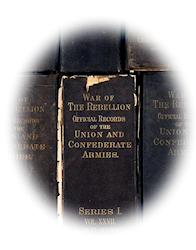“Two Charlestonians who were down here to-day remarked to me that as soon as the State seceded she would demand the surrender of the forts, and that if not given up, they would be taken.”
..
FORT MOULTRIE, S.C., December 1, 1860.
Col. S. COOPER,
Adjutant-General U. S. A.:
COLONEL: I have the honor to acknowledge the receipt of your letter of the 28th ultimo, and regret that I have to report that things look more gloomy than the day at the date of my last communication. Captain Seymour, just returned from the city, reports that the excitement there is very great. Col. E. B. White and other gentlemen, with whom he conversed, stated that the people of Charleston would not allow another man or any kind of stores to be landed at or for these forts. They say that anything which indicates a determination on the part of the General Government to act with an unusual degree of vigor in putting these works in a better state of defense will be regarded as an act of aggression, and will, as well as either of the other acts mentioned above, cause an attack to be made on this fort.
Two Charlestonians who were down here to-day remarked to me that as soon as the State seceded she would demand the surrender of the forts, and that if not given up, they would be taken; but that this would not be done sooner unless some action on the part of the Government proved that it was preparing to hold possession of them.
The agent of the boat which brought the 24-pounder howitzer and ammunition is severely censured for having brought them, and the agent of the steamer James Adger was told that any vessel bringing troops here would not be safe in this harbor. Since writing the above I have seen Assistant Surgeon Crawford, who has also been in the city. He says that never until to-day did he believe that our position was critical. One of his friends told him that we would have trouble in less than fifteen days. He thinks that they will first attempt to take Fort Sumter, which they (justly) say will control this work. Castle Pinckney they regard as theirs already. Mr. King, the intendant of this island, told the doctor that as soon as the act of secession was passed a demand would be made on me to surrender this fort. All these remarks lead to the same conclusion—a fixed purpose to have these works. The question for the Government to decide—and the sooner it is done the better—is, whether, when South Carolina secedes, these forts are to be surrendered or not. If the former, I must be informed of it, and instructed what course I am to pursue. If the latter be the determination, no time is to be lost in either sending troops, as already suggested, or vessels of war to this harbor. Either of these courses may cause some of the doubting States to join South Carolina.
I shall go steadily on, preparing for the worst, trusting hopefully in the God of Battles to guard and guide me in my course. I think it probable that in the present highly excited state of these people, the sending of the detachment of Engineer laborers to Castle Pinckney may bring on that collision which we are so anxious to avoid. I shall consult with Captain Foster on his return to the island, and if convinced that it will lead to that result, will assume the responsibility of suspending the execution of that plan for the present. This fort, in consequence of the unfinished state of our repairs, &c., is not in a condition for inviting an attack. Captain Seymour says that he is satisfied they intend erecting a battery on the upper end of this island, to command the inner channel. I do not know what course to advise. They are making every preparation (drilling nightly, &c.) for the fight which they say must take place, and insist on our not doing anything. We are now certainly too weak to fight. Were we to guard against a surprise, our men, if surrounded by only an undisciplined mob, would soon be worn out by fatigue.
I learn from Captain Ord that attempts have been made, by offers of heavy sums, to induce men at Old Point to join a Southern army. I have not heard that any attempts have been made to tamper with our men, who thus far cheerfully perform the arduous and ceaseless duties imposed upon them in consequence of the smallness of the command.
I ought, perhaps, to mention, as an indication of the expectation of the citizens of Charleston, that three friends of the ladies of our officers have within a day or two been pressed most urgently to go to the city to stay with them there.
I am, colonel, respectfully, your obedient servant,
ROBERT ANDERSON,
Major, First Regiment Artillery, Commanding.
